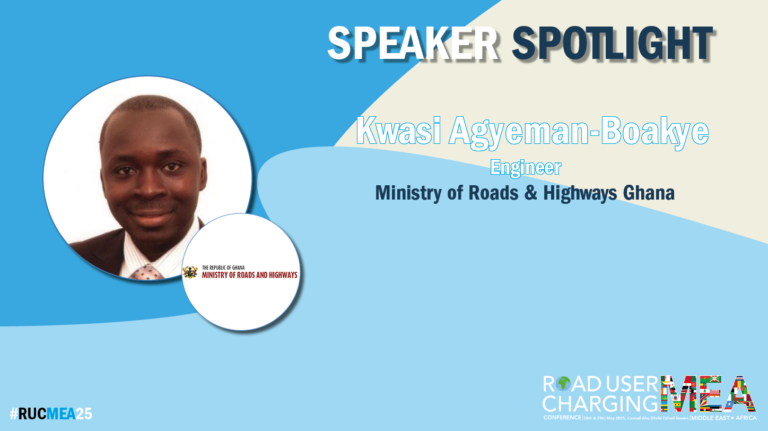As Road User Charging Conference Middle East & Africa (MEA) 2025 approaches, CiTTi Magazine profiles the experts confirmed to speak at the internationally renowned event.
Taking place on 28-29 May in Abu Dhabi, United Arab Emirates, the annual Road User Charging Conference MEA will examine the latest advancements in user-financed transport infrastructure.
This prestigious two-day conference brings together policymakers, industry leaders and innovators to share best practices in the planning, financing, implementation and operation of tolling, road usage charging and mobility pricing schemes across highways, urban roads and cross-border corridors.
Among the confirmed speakers is Kwasi Agyeman-Boakye, principal engineer – policy, planning and budgeting directorate at the Ministry of Roads and Highways, Ghana.
He has more than 15 years of professional experience in creating sustainable and efficient transportation systems, optimising infrastructure investments, and fostering public-private partnerships.
Agyeman-Boakye has expertise in financial management, project planning, and policy coordination makes him a key player in the Ghanaian transportation sector.
Agyeman-Boakye’s session will explore Ghana’s journey with road user charges, highlighting the country’s historical use of tolling, the challenges leading to the 2021 suspension, and the strategic policy reforms underway for reintroducing tolls on a more sustainable and efficient basis.
He will delve into how the experience offers key lessons for other countries in the Middle East and Africa facing similar infrastructure financing gaps.
This will be done by examining toll policy, digitalisation efforts, public-private participation, and criteria for tolling roads, the presentation provides insights into how road user charges can be repositioned as a credible mechanism for road maintenance and investment in developing economies.
 Name: Kwasi Agyeman-Boakye
Name: Kwasi Agyeman-Boakye
Job Role: Principal Engineer – Policy, Planning and Budgeting Directorate
Organisation: Ministry of Roads and Highways, Ghana
What is the most rewarding aspect of your role?
The chance to actively influence national growth by influencing the creation and execution of transport infrastructure policies, programmes and projects. Working on projects that increase safety, reduce travel time, and promote connectivity is tremendously satisfying, since roads are the arteries of economic activity in Ghana.
What is the most pressing challenge for user-financed transportation in 2025?
The greatest problem is combining affordability and sustainability. Many African nations, such as Ghana, have a high need for road infrastructure investment, but users’ capacity and desire to pay remain low owing to economic constraints. Furthermore, institutions frequently lack the capacity to efficiently administer and oversee revenue collecting systems.
What is your best piece of advice for those implementing user-financed transport schemes?
Begin with stakeholder involvement. Understanding user perceptions, concerns, and wants enables the development of context sensitive and socially acceptable solutions. Integrate openness and accountability from the start. Public confidence is the foundation of every successful user financing system.
Does legislation support or hinder innovation in this sector?
Legislation is necessary, but only if it is flexible and supportive. Tolling, infrastructure bonds, and public-private partnerships have all been made easier in Ghana by the appropriate legislative frameworks. But old or too strict restrictions can stifle creativity and delay the execution of projects. To accommodate changing finance structures, new technology, and social and environmental safeguards, legislative frameworks should be evaluated on a regular basis.
How will user-financed transportation schemes evolve by 2030?
We anticipate a major transition to smart and digital finance methods by 2030, such as dynamic pricing and GPS-based tolling. Making decisions based on data will become commonplace, enhancing asset management and revenue forecasts. In West Africa, there will also be more regional cooperation to standardise road pricing schemes across borders.
Why are you looking forward to speaking at Road User Charging Conference MEA 2025?
The conference enables the sharing of Ghana’s experiences, the acquisition of knowledge from peers worldwide, and the exploration of innovative ideas that may be specifically customised to our circumstances. I am enthusiastic in contributing to the discourse on user-finance strategies that are both sustainable and inclusive, as they are advantageous to developing countries.
Discover the key trends and challenges shaping the future of user-financed transportation –spanning tolling, pricing and road usage charging – at Akabo Media’s global Road User Charging Conference series. Join senior decision-makers from around the world as they tackle the issues defining the industry in Abu Dhabi (May 2025), Miami (September 2025), Singapore (October 2025), and Brussels (March 2026). Gain invaluable insights, share innovative ideas and network with global leaders driving the transformation of transportation systems. Click here to learn more and secure your place!





